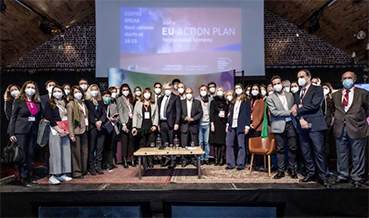Last December, the EU Social Economy Action Plan was officially launched and it was accompanied by two working documents. One of them, titled “Scenarios towards co-creation of a transition pathway for a resilient, innovative, sustainable and digital proximity and social economy ecosystem”, aims at explaining how the social economy and proximity ecosystem has the right potential to contribute to green and digital transitions, strengthening resilience for future shocks.
In this document, the European Commission committed to initiate a bottom-up process, involving social economy stakeholders. The Commission launched a survey to function as a call to action for the wide range of social economy stakeholders, enabling them to provide their concrete contributions.
Social Economy Europe and its members welcomed the Commission proposal and have responded positively to the call to action. As far as the green transition is concerned, Social Economy Europe engages in the set up and the scaling up of green social economy projects at a multilevel scale, strengthening its contribution to quality jobs creation.
Another key priority of Social Economy Europe is to build alliances for the upskilling and reskilling of social economy employees and entrepreneurs in view of the Green Transition and at the same time build partnerships to boost access to finance and equity for green social economy projects.
In the same way, it commits to promote the visibility of social economy innovations for the green transition, to study and disseminate existing good practices. Social Economy Europe is ultimately willing to collaborate with EU Institutions and Member States towards the development of policy and legal frameworks facilitating the further development of green social economy projects.
An inclusive digital transition
In view of the digital transition, Social Economy Europe engages in building pluralistic alliances for the upskilling and reskilling of social economy employees and entrepreneurs. At the same time, it will support social economy actors participation and involvement in strategic EU projects and alliances in areas as artificial intelligences, processors and semiconductors, batteries etc.
Finally, Social Economy Europe is committed to raise awareness on social economy’s potential to lead an inclusive entrepreneurial revolution in the digital economy, inspiring and attracting new talents.
In conclusion, for SEE it is crucial that all actions and measures foreseen by the European Commission and Member States towards green and digital transition are accessible to all social economy enterprises, such as cooperatives, mutuals (public benefit and insurance), associations (including charities), foundations, social enterprises, and other legal forms sharing the same values and features, active in all sectors.
The survey is just the beginning of a participative process that will be lead by the European Commission in cooperation with SEE and other social economy actors.
Social Economy Europe’s members contributions to the Transition Pathway
ESS-France: https://www.socialeconomy.eu.org/wp-content/uploads/2022/03/ESS-FRANCE-CONTRIBUTION-CONSULTATION.pdf
REVES: https://www.socialeconomy.eu.org/wp-content/uploads/2022/03/REVES-Contribution.pdf
Fundación ONCE: https://www.socialeconomy.eu.org/wp-content/uploads/2022/03/222802_FONCE_Transition-Pathway-Survey.pdf







